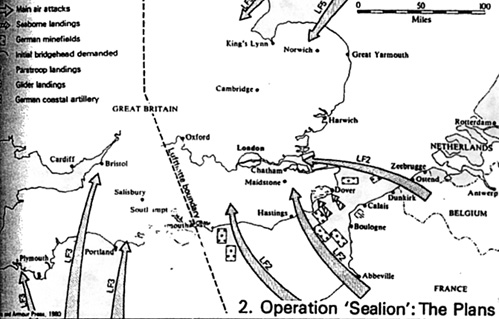 KM Admiral Hipper
KM Admiral Hipper
Being a presenter at Enfilade is fun but a lot of work, and with two small children I must confess I have not contributed as such in several years. However, After reading Bill Stewart's "A Letter From the Enfilade Staff" I decided to take him up on his bribe. The scenario I decided upon is one I have been interested in running for nearly 8 years, but I've never had the table space, the time or the players to do so. Enrilade has the table space I need, and I can make the time on Friday, so all I need now is to get some players to show up for my game. So how can I get players interested in showing up on Friday Night?
Advertise in The Citadel of course!
The Historical Background of Operation Sealion
It's important to remember that Britain has not been successfully invaded since 1066. That is not to say there hasn't been attempts. There were 3 Spanish Armadas between 1588 to 1597, all of which failed. The Dutch had several chances between 1667 and 1688, but did little more than harbor raids on the coastal towns. The French made several serious attempts between 1690 and 1859, but could never quite pull it off. In 1940 it looked like the Germans were about to succeed were all the others had failed due to a new technological development; Air Power.
Before the Second World War, there is no evidence indicating that the German High Command had ever given any serious thought to an invasion of Britain. Even the German 'Z plan' fleet was more of an instrument of blockade and commerce raiding than a tool for invasion, and that "tool" wasn't even supposed to be ready until 1944! The German Navy's ultimate maritime aim was the severing of Britain's supply lines.
All that went out the window when Hitler blundered into war in 1939. Admiral Raeder, the commander-in-chief of the German Navy, found he would have to completely rethink his whole maritime strategy. On November 15th he ordered an invasion study to be prepared. Working with fairly accurate information on the British coastal and inland defenses provided by the German intelligence services, it was completed two weeks later. The plan concluded that an invasion of England was feasible, given the right circumstances.
The Operational study, called 'North-West' by the Germans was then shelved by the German High Command for use at a much later time - probably years in the future. They were wrong. The Blitzkrieg of May 1940 had achieved staggering results. The ease of the French defeat by combined airpower and armoured breakthrough led Hitler to the conclusion that an immediate descent on Britain was indeed possible.
Yet Hitler procrastinated. The first time the German High Command seriously put forth the now Operational Plan 'NorthWest'was on May 21st 1940.
If Hitler had said yes the German military could have been ready as early as July. Hitler, however, wrongly thought that the British would accept his peace proposal. It wasn't Until July that Hitler realized that Churchill wasn't going to give up. Thus on July 16th Hitler issued Directive No. 16, Preparations for a landing operation against England. The operation was given the title 'Operation Sea Lion' (SeeLowe) for the first time. The target date was September 14th.
The small German Navy, depleted by the successful, but draining, Norwegian campaign would have to rely heavily on airpower to make the invasion work. For Sea Lion to work, the Luftwaffe would have to win the air 'Battle of Britain' by mid-September. Needless to say, by September 14th the British RAF was still alive and kicking, and on September 17th Hitler postponed the invasion.
Hitler's Options, May 21st to July 14th 1940
Finally there is the wonderful world of war game 'what ifs'. The stuff gamers live for. My Friday night Enrilade General Quarters baffle is based on the premise that Hitler went for it right from the start. The Germans could have had the invasion force ready as early as July of 1940. Of Hitler's three chances to Launch 'Sea Lion', this one was by far the best. Based on the scenario given by Kenneth Macksey in 'The Hitler Options' this scenario will depict the seaborne landings of the 17th Infantry and 6th Mountain Divisions near Dover.
Can the British Royal Navy and Air Force stop the Germans? Is air power in 1940 an adequate substitute for sea power? Come play the game and find out!

Back to Citadel Spring 2000 Table of Contents
Back to Citadel List of Issues
Back to MagWeb Master Magazine List
© Copyright 2000 by Northwest Historical Miniature Gaming Society
This article appears in MagWeb (Magazine Web) on the Internet World Wide Web. Other military history articles and gaming articles are available at http://www.magweb.com